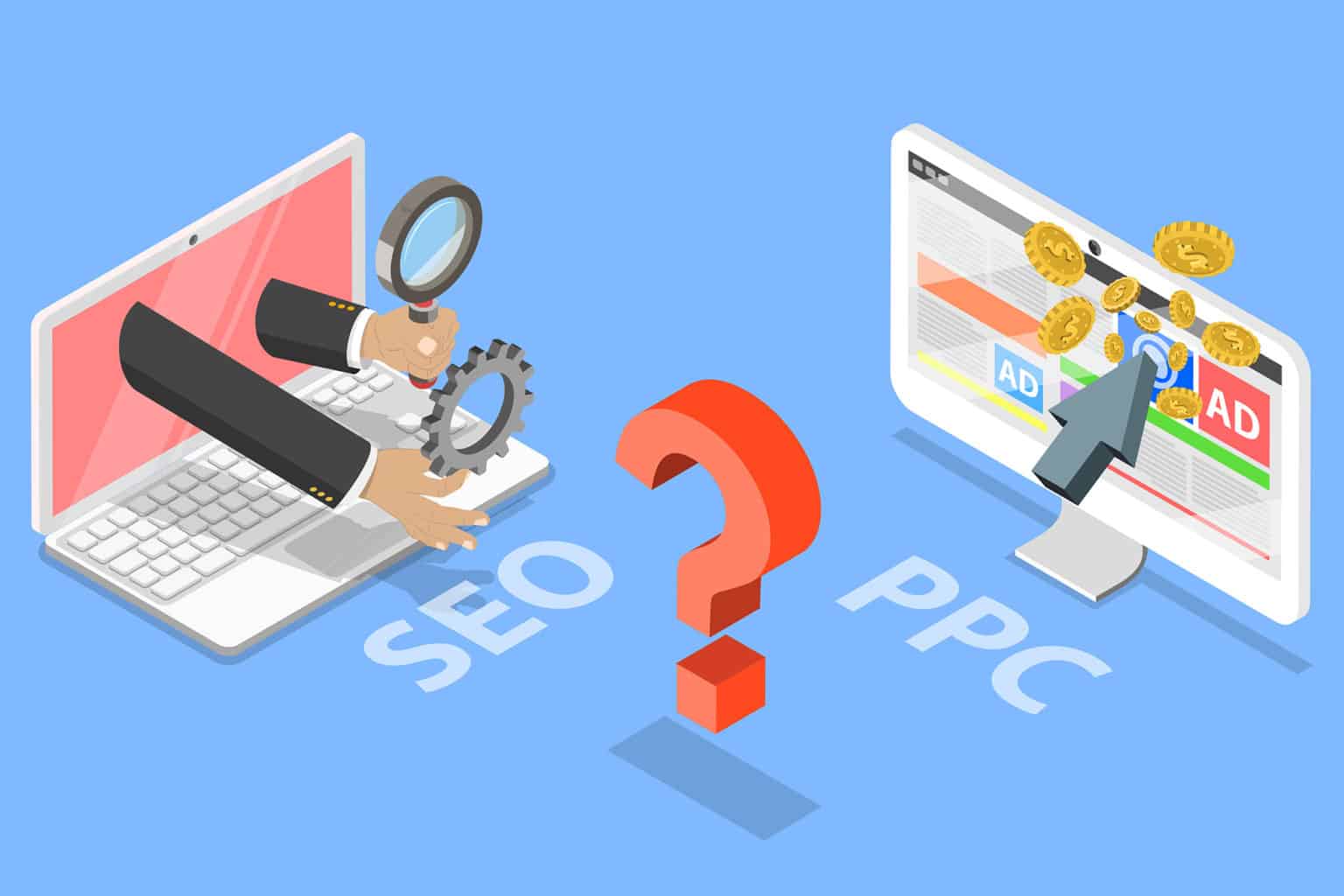On the first day of your intro to online marketing, you will hear the terms PPC and SEO. And as you continue your education, you will keep seeing these terms – for good reason. Both bring a lot of value, but like most things, context matters. So PPC vs SEO – which one is right for my business? Like most things in life – it depends. In this article, we’re going to take a close look at PPC and SEO and breakdown what they are and when each of the two strategies makes the most sense to use.
What is PPC?
Pay per click (PPC) is a form of digital advertising where you pay for an ad when someone clicks on it. When you do a Google search, you’ll see the PPC ads at the top of the result page. Businesses pay to get their ads at the top – they pay in terms of clicks. How much they pay is determined by the keyword they’re trying to rank for and the competition for that word.
What is SEO
Search Engine Optimization (SEO), according to www.webchimpy.com, is the strategy of increasing the quality and quantity of traffic to your website by appearing at or near the top of the search results page through organic (non-paid) means. Unlike PPC, where you pay to get at the top of the page, SEO aims to get there using a long term strategy of producing content people (and algorithms) deem useful and relevant.
How Does PPC Work?
PPC ensures you get some search engine visibility. If you’re looking for instant traffic, then PPC is good. Now that you have a general idea about what PPC is, we’ll take a closer look at the different types of PPC.
Search Ads – Search ads are the most common type of PPC. They appear on the top of the Google search results page when a user performs a search using a specific keyword or keyword phrase.
Shopping Ads – Shopping ads appear on the top of the page or to the right. They only display an image of the product, name, price, and company name. If a customer likes it, they’ll click on it and get redirected to the company’s website.
Display Ads – These ads are mostly used to increase brand awareness. If an online user visits your website, you can continue to market to them with retargeting display ads. They keep your brand fresh in their mind and give them more opportunities to go back to your website and complete their purchase or book a service. The remarketing lists can be highly segmented to specific groups and demographics.
How Does SEO Work?
SEO takes longer to see results from when compared to PPC, but can still be a good overall, or complementary strategy. If you’re looking for a longer term and lower cost strategy, start with SEO. Search Engine Optimization has a lot of moving parts. There are many tools on the market that help you perform SEO audits on your website, and more tools that help you search for the best keywords to use on your website.
Once you know how your website ranks from an SEO standpoint, you’ve found the best keywords to rank for, the next step is getting them into your website using best practices. We won’t go into all the details of best practices here – that’s another entire article – but keyword placement within the page and frequency are two major components.
SEO strategies include:
Content – If you can answer the questions your audience is searching for with blog posts, blogs, or podcasts, that’s good SEO. Blogs, in particular, utilize keywords and build an archive of content you can add to.
Google My Business Page – Google considers your GMB page to be an SEO factor when people search for keywords related to your business. Optimize the features, make micro-posts, and keep it up to date.
On-Page Meta – Meta tags are snippets of text that describe a page’s content. Every page should have an accurate meta description that matches the keyword you’re trying to rank for.
SEO is all about building search engine optimized content over time. It’s not a quick fix like PPC, but it’s still important that your website pages themselves are optimized for search engines at a minimum.
So PPC vs SEO, Which One is Right for My Business?
Time and money will likely determine your strategy. If you want immediate results that are easily measured, then PPC is a good choice. PPC provides you with in-depth data to analyze the ROI on your different PPC campaigns. SEO, on the other hand, takes time to see results, but once you start seeing results, you can build on it in a powerful way. Ideally, you’ll use a mix of both PPC and SEO to get the best long term results.
Need Help with PPC and SEO for Your Business? We can help, contact Doohickey today!

